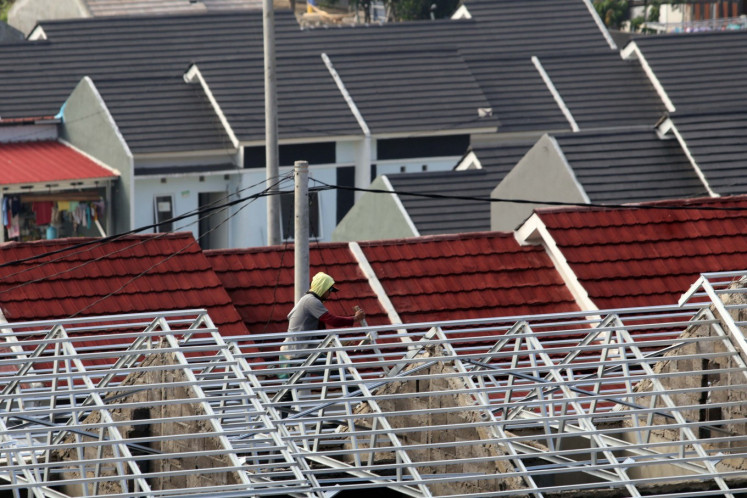Popular Reads
Top Results
Can't find what you're looking for?
View all search resultsPopular Reads
Top Results
Can't find what you're looking for?
View all search resultsMental health intervention key in emergency setting
The triple catastrophes and struggle to remain nationalist have been a challenge for local government officials in the dire time of the emergency response phase since the Dec
Change text size
Gift Premium Articles
to Anyone
T
he triple catastrophes and struggle to remain nationalist have been a challenge for local government officials in the dire time of the emergency response phase since the Dec. 7 earthquake in Aceh.
Aceh, a region faced with a unique set of problems, among others an armed conflict exacerbated by the earthquake/tsunami on Dec. 26, 2004, is constantly being challenged, with the most recent quake striking Pidie Jaya early this month. A series of calamities have had an undeniable impact on the lives of communities.
Even without the decades-long conflict, as Didier Fassin pointed out in his book Humanitarian Reason, natural disasters constitute both the most massive (in terms of number of victims) and the purest (being putatively beyond human control) of collective misfortune.
Violence may have ended in Aceh, but its psychological scars remain. Therefore, one of the most crucial issues to be addressed is mental health.
In 2006 and 2007, collaborative research conducted by the International Organization for Migration (IOM), the Department of Global Health and Social Medicine from Harvard Medical School and the Syiah Kuala University in Banda Aceh designed and implemented a comprehensive mental healthcare model targeting not only the region affected by the tsunami, but also other provinces where this model could serve as a reference to develop mental health.
Psychosocial need assessments were conducted in Pidie, Bireun and North Aceh.
Five days after the most recent earthquake hit Aceh, we set out to Pidie Jaya as part of the Health Ministry’s Mental Health Team. We sat down with survivors, brainstormed with volunteers, collaborated with local officials, shared information with local organizations.
_____________________
Health workers in Pidie Jaya had not received the much-needed PFA training, despite being in a disaster-prone area.
Yet we found a local health official who seemed very distressed in retelling her reaction to numerous amounts of research conducted in Aceh. She underlined the process of securing a permit to conduct
research.
Instantly, I captured a clear picture of local power struggles to remain autonomous and of strong nationalism that emanated from the unavoidable situation of becoming a global laboratory in natural disaster management.
As professionals assigned to Pidie Jaya, our team comprised psychiatrists and clinical psychologists from the Indonesian Psychiatrist Association and Soeharto Heerdjan Mental Hospital in Jakarta. We collaborated with the Community Mental Health Nurses (CMHN) developed after the Aceh tsunami.
Our main task in the acute emergency phase was to implement Psychological First Aid (PFA), which initially began as a model project for survivors of the Merapi eruption in 2010. PFA is a technique to help disaster victims lessen psychological wounds and develop their adaptive functioning, while at the same time accelerating psychological recovery.
The challenge of implementing PFA is training opportunity and standardization of the PFA material itself. To accelerate mitigation efforts after natural disasters, the Health Ministry has divided the country into eight regions, but this awareness contributes less should survivors live in helplessness.
As a preventive measure, these eight regions must receive PFA implementation training.
The training provides health professionals with standardized competence and qualification from the Inter Agency Standing Committee (IASC) Guidelines on Mental Health and Psychosocial Support in Emergency Settings. The trainees may range from community mental health nurses to social workers.
After implementing PFA in Kayoe Jatoe and Jiem Jiem in Cubo, we witnessed different perceptions of PFA itself among health workers. The local health official admitted that health workers in Pidie Jaya had not received the much-needed PFA training, despite being in a disaster-prone area.
We are certain that the cause for this was the limited budget and human resources in the Health Ministry for mental health programs. Nonetheless, it is not too late to use this fact as evidence to push for a proper budget allocation.
The emergency response phase in Aceh was lifted on Dec. 20. The government, through the Public Works and Public Housing Ministry, will now focus on reconstruction and rehabilitation.
It is expected that building debris from the disaster will be cleared as soon as possible as it will help eliminate the survivors’ trauma.
The government expects that by Dec. 30 all the displaced people will be able to return to their homes.
The reconsolidation phase will start soon, continuing the social intervention (reinforcing positive coping, etc.) and psychological intervention (sustainability of psychiatric medication, etc.).
Homecoming survivors who need mental healthcare may be referred to primary health care centers by utilizing general practitioners, as well as one of Aceh’s featured programs.
____________________________
The writer, who chaired the House of Representatives’ working committee drafting the Mental Health Bill
(2012-2014), is a psychiatrist and PhD candidate in public health at the University of Indonesia and research scholar alumnus in mental health implementation research at Harvard Medical School.










